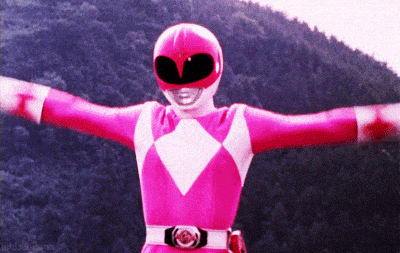|
|
Post by Mighty Jack on Apr 6, 2012 23:08:59 GMT -5
 1944The Miracle of Morgan’s Creek (Director: Preston Sturges) 1944The Miracle of Morgan’s Creek (Director: Preston Sturges)Nominees: Woman in the Window, Double Indemnity, Laura, Jane Eyre, Murder, My Sweet Oscars pick: Going My WayNominees: Double Indemnity, Gaslight, Since You Went Away, Wilson I don’t do schmaltz, and the warmly received Oscar winner Going My Way with Bing Crosby was pure, unfiltered Schmaltz. I do however dig Noir, and Noir hit Hollywood in a big way this year. These pictures –cynical, drenched in shadow and often featuring voice over narration- are about murder and mystery, and feature quick talking guys who lose their heads over a captivating femme fatale. Film noir wasn't new but it was hot stuff in ’44. There was Billy Wilder's dark sardonic Double Indemnity with Fred MacMurray as insurance salesman Walter Nefff who falls for icy Barbara Stanwyck. Fritz Lang offered up Woman in the Window, with its nail-biting plot that breaks like a cold sweat. It stars Edward G. Robinson as the older man who takes a shine for a younger Joan Bennett, which gets him tangled up in murder. Otto Preminger's Laura, where sweet Gene Tierney bewitches Dana Andrews, Clifton Webb and Vincent Price, in a tale of jealousy and obsession. And Murder, My Sweet saw crooner Dick Powell changing his image playing Philip Marlowe. But the movie I like best went for laughs over murder. Miracle of Morgan’s Creek was Preston Sturges’ hilarious poke in the eye to the Hays office. With Miracle, he demolishes the censorship code, while keeping to it. It’s beautifully subversive and marked by madcap screwball antics as well as Preston’s sharp tongue and rapier wit. The story concerns a gal named Trudy Kockenlocker (Betty Hutton) who goes to a party, and winds up married -to a soldier she can’t remember, or later, find- and not only that, she ends up pregnant. Sturges sidesteps the code by having Trudy act drunk, but not actually be drunk – because she hit her head (though seeing her sour expression after drinking the lemonade, I suspect the concoction was spiked). And admitting that she got married when she was "woozy" - being woozy due to a concussion rather than alcohol was okay with the censors. But it makes me laugh how Preston created something controversial, which broke the rules, while managing to stick to the letter of the Hays office law. I think the movie is a blast, but it is over the top. And ones appreciation for it could depend on your tolerance for Eddie Bracken (playing Trudy’s put upon boy…friend?) Hutton and William Demarest's pratfalls, shouting and wild goofing -- And I admit, the last 10 minutes were a bit much, even as a fan of the flick and the director (as brilliant as he was with dialog, Preston was not as deft with physical humor). The shrill finish however, doesn't lead to the ruination of the picture as a whole. If you like the Coen’s crazy comedies (and I do) such as Raising Arizona or O Brother Where Art Thou, know that each was a nod of appreciation for Sturges’ comedic style. |
|
|
|
Post by Mighty Jack on Apr 7, 2012 15:38:15 GMT -5
 1945Children of Paradise (Director: Marcel Carné) 1945Children of Paradise (Director: Marcel Carné)Nominees: Scarlet Street, The Lost Weekend, A Tree Grows in Brooklyn, Open City, Brief Encounter Oscars pick: The Lost WeekendNominees: Anchors Aweigh, The Bells of Saint Mary, Mildred Pierce, Spellbound Billy Wilder's Lost Weekend was a great picture, an important picture about alcoholism, and a good choice by Oscar. Aside from that, I felt the Academy’s nominations a bit weak. I much prefer Kazan's A Tree Falls in Brooklyn, Roslini’s neo-realisitc Open City (co-scripted by Fellini), David Lean's Brief Encounter and Fritz Lang's second feature with the trio of Robinson, Bennett and Duryea, Scarlet Street. In which an older, rather pathetic Edward G. Robinson goes ga ga over trashy young Joan Bennett. I would have chosen the Lang film, if not the poetic genius of Children of Paradise, which many consider the greatest French film of all time. Though I think a strong case could be made for Vigo’s L’Atalante – I guess you could say that they are the Citizen Kane and Casablanca of French cinema, in terms of stature and importance.Carné’s masterpiece is set in the theatrical world, and thus an artificial air hangs over the entire production. With truth and illusion bleeding into both the onstage, and offstage goings on. Despite its dreamy charms, there is something real in it. An honesty – as Terry Gilliam notes in his DVD introduction- that you don’t find in U.S. studio productions. As poetic as it is, Paradise doesn’t ring false, it’s not the gritty realism of a later French film like the 400 Blows, but it comes off just as authentic. The story concerns a woman who draws the attention of several men, causing the ruination of a couple of them. The characters are based on real people. In fact, the real life thief and killer in this film, was the inspiration for Dostoevsky's Raskolnikov in Crimes and Punishment. The film has a kind of melancholy magic to it, especially in the scenes with the pantomime (which I liked best). It runs about 3 hours, with the first half brighter and moving at a quicker pace - the second half, set several years later, has a darker, more leisurely style. Watching them back to back, Scarlet Street is still something special, but Paradise is in another stratosphere. To select anything else would be akin to taking "How Green Is My Valley" over "Citizen Kane". |
|
|
|
Post by Mighty Jack on Apr 9, 2012 23:52:07 GMT -5
 1946The Best Years of Our Lives (Director: William Wyler) 1946The Best Years of Our Lives (Director: William Wyler) Nominees: Notorious, A Matter of Life and Death, Great Expectations, Beauty and the Beast Oscars pick: The Best Years of Our LivesNominees: Henry V, It’s a Wonderful Life, The Razors Edge, The Yearling The truth is Oscar didn't get it wrong in 1946. William Wyler's The Best Years of Our Lives is deserving of every accolade. The film –about soldiers returning home from war- is poignant and wise, and while some films of this ilk become dated, TBYOOL remains powerful and relevant, even with its tidy ending (which by no means indicates it’ll be a tidy life from here on out) I see a few bloggers and the like will place the Christmas perennial It's A Wonderful Life in this slot. And while it’s a goodie, I seem to be allergic to over reaching sentimentality and corn (my hang-up with Chaplin). It's A Wonderful Life has its dark edges, true, but that sticky Capra-Corn is had in heaping mouthfuls (and I mean, come on: So if George Bailey had never been born, the women in his life would have become prostitutes or librarian spinsters?) I believe "Years" holds up better than "Wonderful", but is it the overall best? Its stiffest competition comes from Hitchcock's masterfully directed, wartime romance, Notorious, Powell and Pressburger’s ethereal masterpiece A Matter of Life and Death, in which a pilot goes to Heavenly court to plead for his life. Jean Cocteau's surreal and soulful (as Tomatoes put it) Beauty and the Beast and David Lean's fantastic adaptation of Charles Dickens Great Expectations - a UK production that wont be considered by the Academy until next year, as it didn't play in L.A. until June of 47. Not only that but the year offered up gems like Howard Hawk's The Big Sleep, John Ford's My Darling Clementine, Ernest Hemmingway's The Killers, and the Postman Always Rings Twice. Difficult decision here but If I twist my own arm and force myself, it comes down to two: Notorious and The Best Years of Our Lives. And while I’m a Hitchcock man and find Notorious a nearly flawless production, I see no reason to kick Oscar simply for the sake of being contrary. Best Years of Our Lives was a great motion picture. I hate not picking a brilliant movie from my all time favorite director, but I’m going to spread the wealth (meaning, Hitchcock will be back) and give the Felix to Wyler's film. |
|
|
|
Post by mummifiedstalin on Apr 10, 2012 0:24:57 GMT -5
Henry V. It turns theater into war in a way that Branagh can't.
|
|
Torgo
Moderator Emeritus    -segment with Crow?
-segment with Crow?
Posts: 15,420
|
Post by Torgo on Apr 10, 2012 0:42:19 GMT -5
Henry V. It turns theater into war in a way that Branagh can't. But does it ham up the screen so thick that grease oozes out of the picture? |
|
|
|
Post by Mighty Jack on Apr 10, 2012 0:53:54 GMT -5
It was actually released in the UK in 44, didn't get to the States until 46. I haven't seen it in ages, and don't remember much of the experience, I think I liked it okay but wasn't as wowed with it as most are. (with both versions actually. Henry V just doesn't do a whole lot for me). And as a director Olivier was no Welles (even Welles with zero budget was better... ala Chimes At Midnight)
|
|
|
|
Post by Mighty Jack on Apr 10, 2012 23:39:25 GMT -5
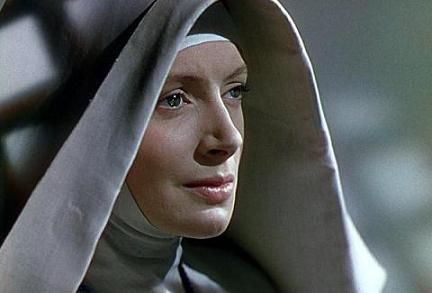 1947Black Narcissus (Directed by Powell & Pressburger) 1947Black Narcissus (Directed by Powell & Pressburger)Nominees: Out of the Past, Monsieur Verdoux, Odd Man Out Oscars pick: Gentlemen’s AgreementNominees: The Bishops Wife, Crossfire, Great Expectations, Miracle on 34th Street Kazan's Gentlemen's Agreement is about a writer (Gregory Peck) who pretends to be a Jew in order to report on the prejudice he faces. While it was a significant picture in 1947, today it seems soft, it doesn't pack the punch it could have. I think Oscar’s other nominees are better – Crossfire also addresses anti-Semitism, but it's wrapped around a murder investigation. I nominated Great Expectations in the year before upon its British release. The Bishops Wife is a cute movie with Cary Grant playing an Angel, which was later remade into a not so good movie with Denzel Washington and Whitney Houston (The Preachers Wife). My nominations include Chaplin's controversial Monsieur Verdoux - controversial because the central character is a lady-killer. It’s a funny flick, and Martha Raye as one of Verdoux’s wives and intended victims, is a hoot and a half (I love the scene in the boat). But of course, as often happens with Chaplin, the film stops being about Verdoux and becomes about Chaplin. And when he steps on his soapbox and blames society, eh, I wanted to puke. I hate when he goes down that self-aggrandizing path. And while it doesn't ruin the picture it does ruin his shot at winning the Felix. Just behind Verdoux is Carol Reed's political thriller, Odd Man Out - It's Roman Polanski's favorite from Reed, he even prefers it to the Third Man. I don't agree, as it has a more theatric air to it than 3rd Man, but it's still a great one - a taut character study about an I.R.A operative on the lam. It stars James Mason in a breakthrough role. In the end it came down to two: Powell and Pressburger's Black Narcissus and Jacques Tourneur's film noir masterpiece, Out of the Past. As I've often done when things are this close, I had a little marathon… and came away from it none the wiser. Narcissus has the sheen of an art piece; it’s an erotically tinged, psychological story about Nuns who set up a hospital and school on a remote mountaintop in the Himalayas. The film is gorgeously shot by Jack Cardiff, and superbly acted, especially by Deborah Kerr. Who plays it reserved, but one can see the little cracks start to show. Out of the Past is less art and more steeped in rougher, B-movie roots. While not as elegant as Narcissus, it's just as amazing a picture. Robert Mitchum is at his coolest playing a guy who is trying to live a normal quiet life, when his past comes back to haunt him. Loaded with tough guys (Kirk Douglas) and one of Noir's best femme fatales (Jane Greer), Out of the Past is worthy of the Felix. But when I try them both out in that top spot, Narcissus simply feels like the better fit, the better film. For the second year in a row I had an impossible choice, and it gets no easier on me next time as I have 4 bonafide classics to choose from, with yet another Powell and Pressburger movie in the middle of it. |
|
|
|
Post by Mighty Jack on Apr 11, 2012 23:26:28 GMT -5
 1948Bicycle Thieves (Director: Vittorio DeSica) 1948Bicycle Thieves (Director: Vittorio DeSica)Nominees: The Red Shoes, Treasure of the Sierra Madre, Red River, Spring in a Small Town, Johnny Belinda Oscars pick: HamletNominees: The Red Shoes, Johnny Belinda, The Snake Pit, Treasure of the Sierra Madre At first I wasn't buying it. I remember the first time I sat through Powell and Pressburger's The Red Shoes –which tells the tale of a ballet dancer who is torn between the man she loves and her dream to become a prima ballerina. The first reel plays and the look is garish and the acting tainted by soap opera theatrics. John Huston's The Treasure of the Sierra Madre appeared secure in its place as the years best. I loved Huston's tale of gold fever – the acting (Humphrey Bogart was so good) and complex character study - scene after memorable scene, filled with quotable dialog - all of it makes for a brilliant and entertaining yarn. But as Red Shoes unfolds, I find myself drawn in deeper and deeper. Yes it was over the top, garish and melodramatic, but gloriously so. The colors were of a rich vibrancy I'd never experienced (No less than Martin Scorsese considers it the most beautiful color film of all time) I began to buy into the emotion and become completely immersed in the story. I was transported, awed by the surreal ballet sequences. And suddenly I was no longer so certain that Madre was the best picture of the year. In fact, the only thing I was sure of was that I'd just discovered something special. 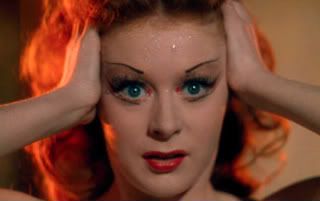 And then entered a new player, an influential piece of Italian neo-realism, DeSica's powerful Bicycle Thieves. The complete opposite to the Red Shoes in every way imaginable – while the line between theater and reality was blurred in the Archer’s film, and fantasy embraced to the full - Bicycle was raw, cast with non professional actors and as unflinchingly real as the dirt under its protagonists fingernails *. It tells of a working class man in post war Rome, who searches for his stolen Bicycle, which is needed in order the keep his much needed and hard won job. While the setting and circumstances are particular to the age, it hasn’t lost its capacity to move. It's an embarrassment of riches, and I mean come on 1948, I love having these delights to watch (and those such as Howard Hawks unforgettable western, Red River or that classic tale of a love triangle set in post war China, Fei Mu's restrained and delicate, Spring in a Small Town). But making me pick just one, that’s plain cruel. As for Oscar's choice? Hamlet is a good movie (despite Oliveir's amateurish direction, which tends to sit the camera on Olivier, at the expense of the other actors or conditions surrounding them), Good, but not within spitting distance of these giants. * Saying that, it too is accomplished mise-en-scène filmmaking. De Sica described his directorial style as, "Transposing reality into the realm of poetry". Unlike other neorealists like Rosellini and early Visconte, De Sica coached his non-actors and didn't allow for improvisation. He also carefully staged and organized sequences, with multiple cameras and angles, so that they were not merely documentary-like in look and style. There is a strong directorial hand at work here. |
|
Torgo
Moderator Emeritus    -segment with Crow?
-segment with Crow?
Posts: 15,420
|
Post by Torgo on Apr 11, 2012 23:29:08 GMT -5
Abbott and Costello Meet Frankenstein.
There were no other films in 1948. This is historic fact.
|
|
|
|
Post by Mighty Jack on Apr 12, 2012 23:06:03 GMT -5
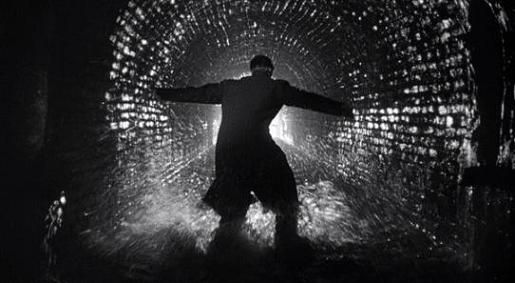 1949The Third Man (Director: Carol Reed) 1949The Third Man (Director: Carol Reed)Nominees: She Wore A Yellow Ribbon, Stray Dog, White Heat, Late Spring, Bitter Rice Oscars pick: All the Kings MenNominees: Battleground, The Heiress, A Letter to Three Wives, 12 O’clock High Finally, an easy pick... Not that my other choices were bad. Among the best: Kurosawa's Stray Dog -about a cop on the hunt to find is stolen gun- Is a sweat soaked, gripping detective story wrapped around sociopolitical issues. She Wore A Yellow Ribbon is one of my all time favorite John Ford/John Wayne pictures, with Wayne doing stand-up work playing an aging soldier. I don’t mind Oscar's choice, though its story of the rise and fall of a politician is sporting a few cobwebs these days. MSTies curious to see how effective John “Gunslinger” Ireland is in a quality film should check it out. But The Third Man, written by Graham Greene, is in a world of its own. I'm a sucker for a good mystery, and this politically drench tale is a gripping mystery (at first), but it's also a keen examination of moral bankruptcy with a wry sense of humor. Joseph Cotton is rock solid as the dogged Holly Martins - and while Orson Welles' part is small, it's iconic: From his first appearance in the shadows, to the speech about cuckoo clocks – he makes an impression. The atmospheric direction features Reeds best work and hey, zither music! I recently watched it again, and was surprised at how fresh and contemporary it has remained. Like Citizen Kane or Casablanca, the film only gets richer, offering new revelations with each viewing. I loved it when I first saw it as a teenager, and while it didn’t seem possible, my admiration for it grew stronger after watching it 30 years later. Roger Ebert described it perfectly, as being like the exhausted aftermath of Casablanca. Ahh, and what a brilliant double feature that would be. |
|
|
|
Post by Mighty Jack on Apr 13, 2012 23:31:58 GMT -5
Oops, I thought yesterday was Friday. Imagine my disappointment when I realized I had to go to work today. Urg! So here’s one more before I take the weekend off. See ya Monday.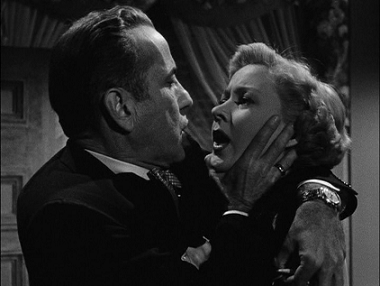 1950In A Lonely Place (Director: Nicholas Ray) 1950In A Lonely Place (Director: Nicholas Ray)Nominees: Orpheus (Orphée), Sunset Boulevard, Rashomon, All About Eve, The Young and the Damned (Los Olivados), Winchester ‘73 Oscars pick: All About Eve Nominees: Born Yesterday, Father of the Bride, King Solomon’s Mines, Sunset Boulevard The 50s might be my favorite movie era; it was a decade that saw great directors like Kurosawa, Hitchcock, Kazan and Bergman in full command of their craft. It was the decade that introduced us to Fellini, Marlon Brando and Audrey Hepburn. Westerns found a renewed vigor, sci-fi classics, and foreign masterpieces were plentiful. Movements included the birth of the French New Wave and American Method Acting. While not everything is peaches and cream: I can't stand Born Yesterday, or Judy Holiday's adenoidal performance (which won an Oscar). And Father of the Bride did little for me. Overall, the 50s opened with a bang! There was Jean Cocteau's Orphee. A brooding poetic retelling of the myth of Orpheus set in modern Paris. The film provides some nice surrealistic imagery and ideas (walking through mirrors - the angels of death are leather clad bikers, etc). In addition that one, Kurosawa had an international hit with Rashomon, Luis Buñuel gave realism a go (with a few Buñuelian flourishes) in his unflinching look at delinquency, The Young and the Damned (Los Olivados) And Billy Wilder offered up the smartly biting Sunset Boulevard, which saw the return of screen siren Gloria Swanson in an Oscar nominated role (and she should have won it). Mr. Smith Goes Ballistic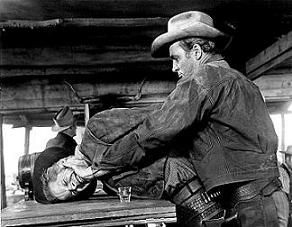 We also got to see Jimmy Stewart's darker side in the western Winchester '73, and I enjoyed the Oscar nominated King Solomon's Mines. All About Eve? That was a great movie; and in a lesser year I’d have picked it in a heartbeat. But in 1950 several flicks surpassed it, including: Rashomon, Orpheus, Sunset Boulevard, and -for me- In A Lonely Place. Directed by Nicholas Ray, the movie is like a punch in the gut. And it must have hit me hard because Ray's film actually outshines 3 from my all time favorite directors (Kurosawa, Buñuel and Wilder) I like love stories, but for some strange reason I'm drawn to love unrealized, unrequited or heartbroken. A few of my favorites - Casablanca, even the light Roman Holiday do not close with its star crossed lovers together. And In A Lonely Place might be the most devastating of them all. In Casablanca and Roman Holiday there was a nobility in the sacrifice. In Lonely, the man -with a violent tempter- is responsible for destroying his one chance at true happiness... and it shatters me every time I see it (and yes, he is under suspicion for murder and the strain of it helps to cause his downfall). This was some of Humphrey Bogart's best work. World weary, cynical – his Dixon Steel discovers a little light and optimism when he falls in love with a good woman, played by Gloria Grahame. Grahame is ever an actress I've liked - with her mix of vulnerability and confidence- and here, she is equal to Bogart - it's a great pairing. I know I'm in the minority with this pick, but of the top pictures (and they are an amazing lot), nothing packs as much an emotional wallop as this one. It also boasts of my all time favorite movie quote: "I was born when she kissed me, I died when she left me, I lived a few weeks while she loved me."
|
|
|
|
Post by Mighty Jack on Apr 17, 2012 0:25:04 GMT -5
Oookay, what happened to my post? One minute it was there, I come back and it's gone! And I cleared it out of word already so I'll just scribble this out. As we say in the movie game... I am Furious Yellow!  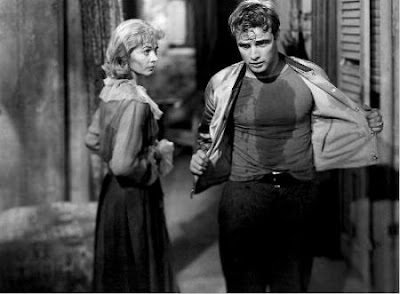 1951A Streetcar Named Desire (Director: Elia Kazan) 1951A Streetcar Named Desire (Director: Elia Kazan)Nominees: Diary of a County Priest, Strangers on a Train, A Place in the Sun, Ace in the Hole, Day the Earth Stood Still Oscars Pick: An American In ParisNominees: Decision Before Dawn, A Place in the Sun, Quo Vidas, A Streetcar named Desire Well then, since I've lost my well thought out post I'll just wing it here... The movie that made Brando a star is my pick for the year. Marlon gives an electrifying performance, and he is surrounded by an ensemble that was at the top of their game. This is truly an acting tour de force. It is also the best adaptation of a Tennessee William's play to date. I also liked Robert Bresson's Diary of a Country Priest. Which is about a sickly, depressed young Priest who is assigned to a Parish in a town full of dickweeds. Though it's unrelentingly bleak and -as with most Bresson films- too wordy. It is expressive and left its mark on my mind and soul. Third on my list is Hitchcock's tense and chilling Strangers on a Train. Followed by the polarizing movie based on a true crime story, A Place in the Sun. Billy Wilder's gut wrenching Ace in the Hole, and Robert Wise's sci-fi classic, Day the Earth Stood StillOscars pick is okay, but not the best Gene Kelly musical and far from the best film. I'm surprised they ignored the African Queen, it seems a film suited to them. I'm also surprised Streetcar, which got so much acting love form the Academy, was bypassed as best picture. But I guess they liked the sugary confection that was An American in Paris. |
|
|
|
Post by Mighty Jack on Apr 17, 2012 23:04:23 GMT -5
 1952Ikiru 1952Ikiru Nominees: The Quiet Man, Umberto D, Forbidden Games, Bend of the River, Singin’ in the Rain Oscars pick: The Greatest Show on EarthNominees: High Noon, Ivanhoe, Moulin Rouge, The Quiet Man Greatest Show On Earth was an entertaining trifle, but it shouldn't have been allowed anywhere near a best picture award. In truth, aside from the 10 Commandments I don’t know if anything directed by Cecil B. Demille could be considered best picture worthy. Maybe they were just rewarding a long career (if so, they should have waited, as we will soon see) What astonishes fans even more was that Singin’ in the Rain was locked out as a nominee. Many critics feel it's the greatest musical ever made, and the best movie of the year. Me, I prefer Swing Time as the greatest dance musical, and a few other movies as the years best. While Singin’ has top-notch music and dance numbers, the story and situations are so damn silly and contrived. And Gene Kelly does this goofy open mouth smile thing while he dances that drives me batty. It's a weird nitpick I know, but it bugs me nonetheless. So Singin’ gets a deserved nomination but not all my love. Ahead of it I rank the Anthony Mann/Jimmy Stewart western, Bend of the River, and a strange story of children set during wartime, Forbidden Games (which won a special foreign language film Oscar). DeSica's Umberto D (about an old man and his dog) and the John Ford classic The Quiet Man, with John Wayne and Maureen O’Hara. Above the Quiet Man I place Akira Kurosawa's important, landmark offering, Ikiru. Takashi Shimura stars and it is arguably the most memorable performance of his career. He plays a dying man named Wantanabe - a Government agency paper pusher who has accomplished little with the job. He's a widower, with a brother who doesn’t really know him, and through his own fault, a non-existent relationship with his son. You could say his life has been a bit of a waste. One of the films powerful scenes comes after Shimura learns that he has stomach cancer. He leaves the doctors office lost in his own thoughts -- when suddenly the silence of the scene is broken by a burst of sound -- the city comes to noisy life. The camera pulls back - he is so very small - life goes on with you and without you. The story follows his quest for meaning and happiness, his failed attempt to repair his relationship with his son and finally, in the 2nd half of the movie -in flashbacks during his funeral- what he did to leave this small corner of his world a little better after he was gone. While Ikiru is wordy and at times Kurosawa does indulge that didactic nature of his (where he tells us what it’s all about), he doesn’t over do it, and butts these moments against ones where he doesn’t fill in every detail; there are gaps in the narrative and the back-story that we have to fill in for ourselves. There are also scenes where he allows facial expression alone tell the story. Though I found it uplifting, it isn't simply a warm and fuzzy tale; the ending doesn’t tie everything up in a neat bow. While the lead character finally finds what he’s looking for and does something important... life goes on as it always does. Only one other guy (a co-worker) understands this, but he is helpless to do anything to change the course. The wheel grinds on and nobody opens their eyes -- unless they are forced to. This thoughtful meditation on what it is to live a meaningful life is one of the director’s finest pieces. Offering many a lasting image, it is profound and stays with you long after its over. The acting is honest and the direction impeccable (this is the last film where Akira leans on wide angle shots, from here on out telephoto lenses will become his tool of choice). |
|
|
|
Post by Mighty Jack on Apr 18, 2012 23:10:40 GMT -5
 1953Tokyo Story (Director: Yasujirô Ozu) 1953Tokyo Story (Director: Yasujirô Ozu)Nominees: Ugetsu, Roman Holiday, Shane, The Wages of Fear, Earrings of Madam de… The Naked Spur, The Big Heat Oscars pick: From Here to EternityNominees: Julius Caesar, The Robe, Roman Holiday, Shane The Japanese invasion continues with two towering artistic achievements, Kenji Mizoguchi's Ugetsu, which is the story of a man who falls in love with a vengeful ghost, and Yasujirô Ozu's Tokyo Story – a quiet heartbreaking story of an older couple who are seen as burdensome by their children and their spouses. It offers little that we haven’t already seen from Ozu. As with Late Spring, there’s the same strange composition that breaks continuity, coupled with narrative ellipses – all of which makes it a challenging visual effort. You get many of the same actors, giving similar performances and the theme that life is about undergoing change, with the old giving way to the new. Despite the familiarity, it's a great motion picture. Other highlights on the year: Brando showed his range by taking on Shakespeare in Julius Caesar. Jimmy Stewart continued to show he was more than a home spun nice guy in another dark Anthony Mann western, The Naked Spur. The Western in general continued its ascension in the 50s, with the enduring classic, Shane, starring Alan Ladd as the legendary gunfighter drawn back into the violence he'd hoped to leave behind. Max Ophüls shows off his trademark tracking shots in the romantic tragedy The Earrings of Madam De... and Henri-Georges Clouzot directs the cynical and suspenseful The Wages of fear. I adore Roman Holiday, -which introduced most American’s to that enchanting sprite, Audrey Hepburn- and number it as one of my favorite films. It might be fluffy romantic comedy, but it’s a special one. And while I liked Oscars pick From Here to Eternity well enough, the films from Japan were the years best, with Tokyo Story earning the Felix. |
|
|
|
Post by Mighty Jack on Apr 19, 2012 23:57:02 GMT -5
 1954The Seven Samurai (Director: Akira Kurosawa) & On the Waterfront (Director: Elia Kazan) 1954The Seven Samurai (Director: Akira Kurosawa) & On the Waterfront (Director: Elia Kazan)Nominees: Rear Window, La Strada, Samurai I: Musashi Miyamoto, Godzilla, Hobson’s Choice, Johnny Guitar Oscars pick: On the Waterfront Nominees: The Cain Mutiny, The Country Girl, Seven Brides For Seven Brothers, Three Coins in the Fountain A great, great year. And yes, I'm calling my one and only tie. I simply refuse to choose between my two favorite films of all time. Kurosawa's Seven Samurai is epic and human. And Kazan's controversial On the Waterfront - Which sometimes get knotted up in politics, but I take it as the story of one man's journey for redemption. Each deserves the Felix and each will get one. (Of Note: Oscar has had 2 ties, in the actor/actress category. So I won't feel guilty allowing myself one for Best Picture) Aside from them there was Hitchcock's Rear Window and Fellini's La Strada, both incomparable masterworks that stood just a breath behind my leaders. In addition, I'm nominating Godzilla. A movie every bit as good and important as King Kong (which I've seen selected as Best Picture in other peoples lists. I don't think it’s so absurd to have a giant monster movie receive some much-deserved love). And I really dig the first part of Hiroshi Inagak's Samurai Trilogy, Musashi Miyamoto, which starred Toshiro Mifune. It will win the best foreign language film award in 1955. The low budget Salt of the Earth is another worth mentioning. Though it can be didactic and wooden, its examination of workers rights, racism and feminism makes for compelling viewing, it is also of interest as it was co-produced by a Union and was made by blacklisted director, writers and actors (including Will Geer, who would go on to play grandpa on TVs "The Walton's"). Hobson's Choice, from director David Lean, Johnny Guitar and most remarkably Rear Window, did not receive nominations. All 3 are better than the decent but unremarkable Three Coins or even Country Girl. The Academy did nominate some top-notch movies, among them The Cain Mutiny, A Star is Born and the entertaining Seven Brides for Seven Brothers. And they gave La Strada a Foreign film Oscar. In addition to that they got it right when they picked On the Waterfront as its best picture. Not bad work for the folks in Hollywood. |
|






